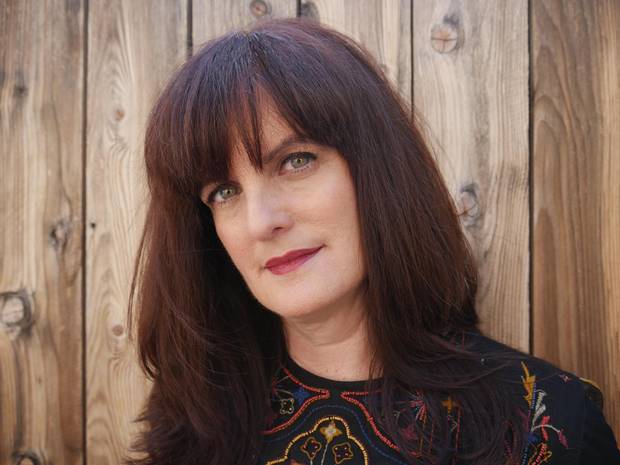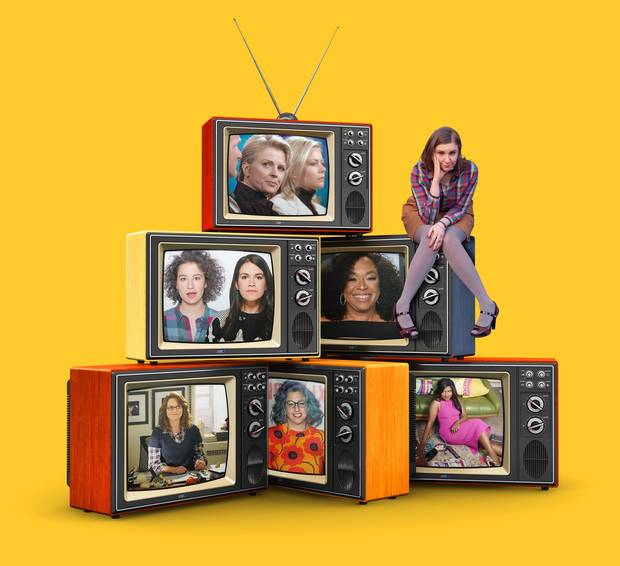Stealing the Show
By Joy Press, Atria Books, 320 Pages
Just the Funny Parts
By Nell Scovell, Dey Street Books, 336 Pages
Every woman who writes for TV has stories about sexism in the industry, ranging from mundane (enduring male-director temper tantrums that would get a female director fired), to gender-equity issues (getting paid less, or not being hired at all because they "already have a woman in the room"), to harassment or worse.
One of my stories is from one of the first shows I worked on. I was watching a rough edit of a scene with the producers, wherein a female character was doing a "walk of shame" (in itself the kind of sexist shorthand that reinforces misogyny. But I digress). Beautifully silhouetted against the rosy dawn, she stumbled along in heels and her short, tight, sexy dress from the night before. And nothing else. "Oh no!" I gasped. "Where's her purse?" The producers laughed at my ignorance, explaining that you'd never make an actress carry a purse in a scene like that because it would ruin the line of her outfit and spoil the shot.
I considered, and then – wanting to stay employed – discarded, the idea of suggesting that ruining the line of her outfit might be preferable to making female viewers wonder where exactly she had stuffed her phone and keys. But, as I now realize, female viewers were not the point. The male gaze is for a male audience. The standard, "likeable" TV female is not a real, grown-up human schlepping her keys/phone/tampons/whatever around town. She's an ever-accessible sex object, artfully displayed, here to serve at the pleasure of the patriarchy.
Unlike my younger self, I now speak up about these things. But I must say, it's not much fun telling your executive producer boss that his failure to accessorize contributes to rape culture.
So it's great to see two new books support the case that the patriarchal devil is in the male-gaze details. Just the Funny Parts … and a Few Hard Truths About Sneaking Into the Hollywood Boys' Club by veteran TV writer Nell Scovell, is a behind-the-scenes tell-all from various writers' rooms. Stealing the Show: How Women Are Revolutionizing Television, by journalist Joy Press, profiles the women who created such groundbreaking shows as Murphy Brown and Roseanne, up to Transparent and Broad City.
Scovell, writing from the trenches, pulls no punches, reproducing savagely edited script pages, documenting exactly how male colleagues undermined her and how male crews sabotaged her when she began to direct. Amazingly, she doesn't come across as bitter. Aware of her white privilege and thankful for a career that included
Newhart, Late Night With David Letterman, The Simpsons, Murphy Brown, a creator credit on Sabrina the Teenage Witch, and a collaboration with Sheryl Sandberg on Lean In, she reports transgressions in the spirit of a wide-eyed, albeit head-shaking kid, telling us "and then THIS happened!"
Nor does she spare herself, cheerfully including jokes that never made it when she wrote for U.S. President Barack Obama's White House correspondents dinner speech; her fantasy of winning Letterman's approval even after she exposed his show's toxic work environment in print; describing how she performed fellatio on her abusive boss, Jim Stafford, at a Smothers Brothers Comedy Hour work party. When Stafford then dropped her from the show, Scovell took it as a learning experience. She'd submitted to him because she'd feared he would penalize her, yet she writes, "he still penalized me. In a way it was funny." (It also gave her the best line in the book: "Reader, I blew him.")
Even more abusive, in my view, was when Scovell wrote for the Lily Tomlin segment in 2014's The Kennedy Center Honors special. She suggested Kate McKinnon, Reba McEntire and Sarah Silverman, dressed as the 9 to 5 movie characters, blast out the 9 to 5 theme song in a rousing finale. The producers had never heard of McKinnon and didn't think music was necessary.
For men who don't see the foul here: Imagine you're a writer for a tribute to, say, Mike Myers. Your bosses are all women. You suggest a finale with Dana Carvey and other celebrity bros headbanging to Bohemian Rhapsody. The producers haven't heard of Queen. They want something more verklempt. Your head explodes.

Stealing the Show author Joy Press.
In Press's book, the contents page alone conveys the impact of women creators on contemporary TV: Shonda Rhimes (
Grey's Anatomy), Amy Sherman-Palladino (Gilmore Girls), Tina Fey (30 Rock), Mindy Kaling (The Mindy Project), Lena Dunham (Girls), Liz Meriwether (New Girl), Jenji Kohan (Orange is the New Black), Jill Soloway (Transparent), Amy Schumer (Inside Amy Schumer), Abbi Jacobson and Ilana Glazer (Broad City). Two important shows are either missing (Tig Notaro's One Mississippi), or given short shrift (Issa Rae's Insecure.) And Michaela Coel (Chewing Gum) deserves at least a mention. But maybe it's a good sign there are too many women creating good TV to fit into one book.
It's the details from two earlier shows, Murphy Brown and Roseanne, that most fascinate. Press puts Roseanne Barr's reputation for being "difficult" and "crazy" in a new light when she describes how male producers tried to make her wear purple stretch pants and smocks instead of the vintage plaid shirts she, and her character, favoured, or how they almost fired her over a nuance Barr understood instinctively, but which they couldn't get their heads around: She refused to say the line, "You're my equal in bed but that's it," to her TV husband Dan, knowing that her character, as feisty as she was, would never "demean" him that way. Press quotes Judd Apatow (who wrote for Barr's stand-up act when he was 22): "A lot of people painted it as out-of-control behaviour, but really it was someone taking control of her world as best she could. She made landmark television for a really long time, and it was done in a unique, eccentric way." Note also that Barr, as far as we know, didn't pressure anyone to service her sexually, then fire them.
Barr's fight to give a voice to characters that reflected her reality feels especially ironic in 2018. As Press reports, Barr told the Los Angesles Times her struggling television family didn't trust the left or right wing. "They're somewhere in the middle of it all, not knowing what anything stands for any more." That was in 1992. With a reboot of the show set to begin March 27 on ABC, it'll be interesting to see where the Conner family's politics are now.
Press begins her book with Diane English, who created Murphy Brown in 1988. Two events ensured the show's place in history. First, the day after English submitted her pilot script to CBS, the Writers Guild went on strike. This meant network execs couldn't force English to rewrite her "middle-aged woman after rehab" into a thirtysomething career gal "coming back from a spa." The second event was when star, and devoted mother, Candice Bergen said it would be "too tragic if Murphy didn't have a child" and English agreed.
A male room might have come up with the accidental-pregnancy trope. And kudos to CBS execs for not forcing English to segue to the sad (but socially acceptable) miscarriage trope. But this baby happened because of two women's combined instincts, and because the female voice was allowed to prevail. And the right wing went nuts. While blaming impoverished, black, unwed mothers for the L.A. riots following the Rodney King beating in 1991, U.S. vice-president Dan Quayle also slammed Murphy Brown for its lack of "family values." As Press reminds us, the rebuttal episode had 70 million viewers, and the show went on to record-breaking ratings and ad revenues, multiple Emmys, and 10 seasons in total. Like Roseanne, Murphy Brown is also being rebooted this year, with English in charge.
Meanwhile, Bergen has lately started a handbag-customizing company, BergenBags ("from one old bag to another"), with proceeds going to charity. And, just for the record, if you Google images, you can find screenshots from the original run that show Murphy carrying a big, old, ugly purse.
Ellen Vanstone is a journalist and screenwriter based in Toronto.



